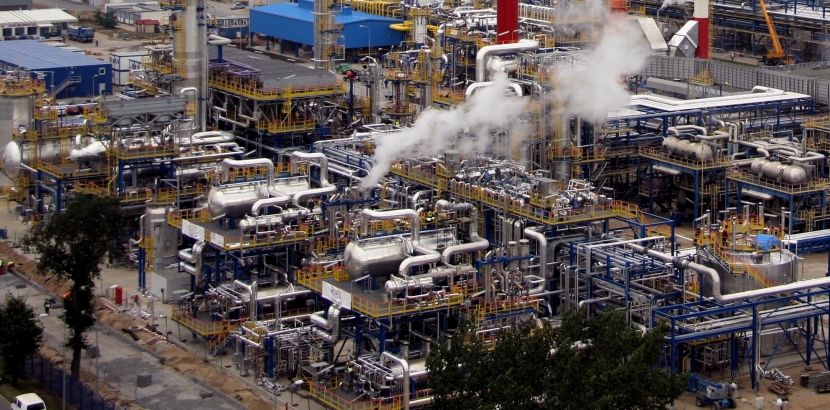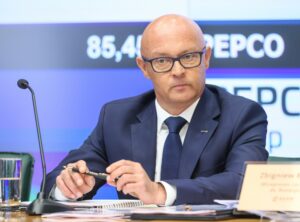Orlen’s interim CEO promises the company’s policy will be driven by its business interests. If it really was the case, Poles would immediately return to cheaper oil from Russia, which everybody knows cannot be done. Therefore, it is necessary to end the rift between business and politics – writes Wojciech Jakóbik, editor-in-chief at BiznesAlert.pl.
- Orlen presented the 2023 financial results at a press conference with the new management board headed by Witold Literacki who will lead the company until the competition for the new boss ends. „All our decisions will be driven by business needs,” the new CEO assured.
- Should Orlen be still responsible for energy security at all cost, or focus on maximizing the shareholders’ profits? These goals can be contradictory, as evidenced by the desirable divorce from Russian oil – asks Wojciech Jakóbik.
- Perhaps the best solution is to separate from Orlen its strategic fuel and natural gas assets and sell them to PERN and PGNiG respectively. This would give Orlen freedom to pursue its business goals.
Orlen presented the 2023 results at a press conference with the new management board headed by Witold Literacki who will lead the company until the competition for the new boss ends. „All our decisions will be driven by business needs,” the new CEO assured. However, the oil, gas and fuel policy of Poland will never be just about business, which may mean the need to “render to Caesar the things that are Caesar’s, and to God the things that are God’s”.
„In the fourth quarter of 2023, the energy sector recorded a decrease of PLN 0.9 billion year – on-year as a result of the negative macro impact, the write-off to the Price Difference Payment Fund and lower revenue from the Baltic Power with the positive impact of higher sales volumes and higher result of PGNiG Group as a result of full consolidation,” said Michał Perlik, Chief Financial Officer of Orlen.
Refinery margins fell by 38 percent in the fourth quarter of 2023 compared to the second. The price difference between the value of Orlen’s barrel and the one on the market was-2 dollars. This means that refineries began to lose money, because the non-Russian oil is more expensive and the one from Russia, which had to be dropped after the invasion of Ukraine. It should be noted that the facilities are gaining security of supply in return, because the Russians threaten to interrupt supplies through the Friendship Oil Pipeline to Germany and stopped gas supplies in violation of Gazprom’s Yamal contract. Oil from Russia is cheap only on paper. We know this, but political depth is needed for such an assessment to go beyond the business charts.
It is therefore necessary to reform how the Polish hydrocarbon sector is managed. I already made some suggestions in March 2023. The Polish market should complete its departure from Russian oil by improving the transparency of the sector by releasing to the public information on the usage of the oil infrastructure and market transactions, similarly to the energy and gas markets in the EU. PKN Orlen management needs to be reformed, so that the Polish state is able to maintain control over tools necessary to ensure security of supply using an entity that will replace the existing ones after the Orlen and Lotos merger and the takeover of PGNiG.
It is worth using the example of the latter company. Despite the fact that it is listed on the stock market, its statute says that it is obliged to pursue energy security. An extreme example is the oil transmission infrastructure operator PERN, which is completely owned by the State Treasury. A joint-stock company in the form of PKN Orlen does not have such provisions, and thus the obligation to be responsible for energy security. This therefore depends on the will of the board. Today the will is here, tomorrow it may not be. Orlen in its current form is irretrievably torn between business and politics, as evidenced by disputes over lowering prices at stations before elections or using strategic fuel reserves. Orlen confirmed at the conference with the new management a one-time profit from the sale of fuel reserves in the amount of PLN 200 million, giving rise to suspicions that this is a confirmation that it had tapped into its fuel reserves to lower gas prices before elections.
Should Orlen continue to be responsible for energy security at all costs or focus on maximising shareholder returns? These goals may be contradictory, as evidenced by the highly desirable divorce from Russian oil. To temporarily and formally ensure security of supply the Polish government signed an agreement on 20 July 2022 where it declared it would implement Poland’s energy policy when it comes to oil and liquid fuels. It is supposed to provide rules for further diversification and independence from Russia. However, this declaration is not legally binding.
This means, therefore, that even after the breakup with oil and Russian fuels is completed, the market will need to be reorganized after the merger of PKN Orlen-Lotos in order to ensure security of supply. A number of solutions are available, from the nationalisation of PKN Orlen to the transfer of relevant assets to a company under de facto state control. In this context, the arguments for and against the re-acquisition of Saudi Aramco’s shares in Rafineria Gdańska should also be weighed against other safeguards, such as the right of pre-emption.
This reform, like the merger, will take place in the face of uncertainty arising from the war in Ukraine and market disturbances around the world that make linear forecasting of trends difficult. Parting with Russian oil is the beginning, not the end, of challenges on the Polish market. Perhaps the best solution is to separate from Orlen its strategic fuel and natural gas assets and move them to PERN and PGNiG respectively. This would give Orlen freedom to pursue its business goals.
However, the re-organisation of the market can also be a business challenge, especially given PGNiG’s huge role in propping up Orlen’s financial results. Business will approach any reshuffling with caution, but it may be imposed by the energy security policy anyway.
However, we will learn more only from the board selected in the competition. „As in the case of Polska Press, we conduct analyses, audits and interviews with employees,” said Witold Literacki, President of Orlen, about the speculation about a possible separation of PGNiG in response to a question from BiznesAlert.pl. „At this point, we don’t have the conclusions yet to be able to decide whether to confirm that we will want to conduct a disinvestment or anything else. We need to get acquainted with the facts of the companies, properly assess it and then a decision will be made. Only then will we share the specifics,” he said.









